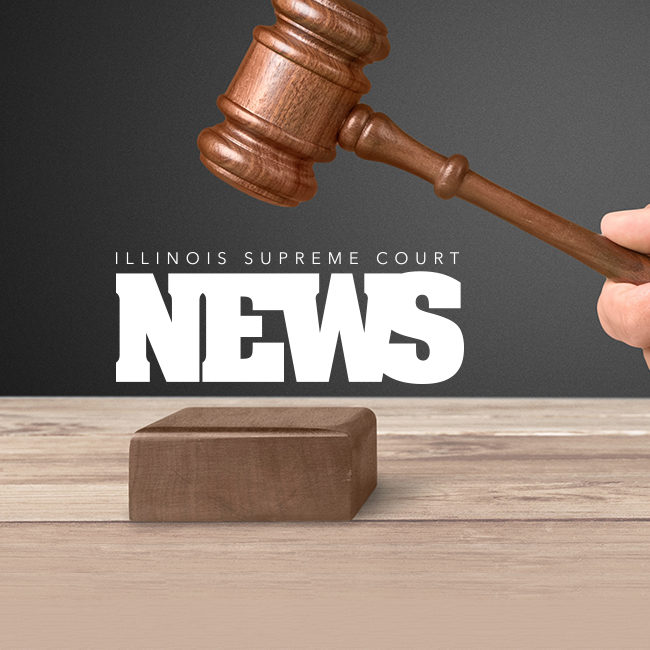Memorial Service for Justice James D. Heiple

WHAT: Memorial service honoring the late Justice James D. Heiple
WHEN: 2 p.m., Wednesday, Sept. 22, 2021
WHERE: Supreme Court Courtroom, 200 E. Capitol Ave., Springfield and livestream
The Illinois Supreme Court will host a memorial service in honor of the late Justice James D. Heiple, who served on the Illinois Supreme Court from 1990 to 2000. A program will be available for download on the Court’s website a few days before the service.
Public attendance will be via livestream at https://livestream.com/blueroomstream/events/9760878
Opening and closing remarks for the service will be made by Chief Justice Anne M. Burke.
Those scheduled to offer tributes include Supreme Court Justice Robert L. Carter, retired Supreme Court Justice S. Louis Rathje, U.S. District Court Senior Judge Richard Mills, Third District Appellate Justice William Holdridge, Second District Appellate Justice Liam Brennan, and attorney Jonathan Heiple, Esquire, of Heiple Law Offices, who is the late Justice’s son.
James D. Heiple was born in Peoria, Illinois on September 13, 1933. He graduated in 1955 from Bradley University and in 1957 from the University of Louisville Law School. Later in his career, he received a Master of Laws degree from the University of Virginia in 1988.
After passing the Kentucky and Illinois Bar examinations, Justice Heiple joined the family law firm of Heiple & Heiple in Washington. In 1959, he opened an office in Pekin, developing an extensive practice in municipal law and as corporation counsel for several municipalities. He also served as an appellate law clerk, a public defender, and a Special Master in Chancery.
In 1970, Justice Heiple won election to fill a Tazewell County Circuit Court vacancy. In 1980, he became a Justice of the Third District Appellate Court. In 1990, Justice Heiple sought the Third Judicial District seat on the Illinois Supreme Court to succeed retired Justice Howard C. Ryan and defeated Illinois Appellate Justice Tobias Barry by less than one percentage point. He became Chief Justice in 1997, resigned the position after several months, but remained on the Court. In 2000, he chose not to run for retention and retired from the judiciary after 10 years on the circuit bench, 10 years on the appellate bench, and 10 years on the supreme court bench.
During his career, Justice Heiple served as the Illinois Judges Association president, Tazewell County Bar Association president, held memberships in the Illinois, Kentucky, and federal bar associations, and chaired councils of the Illinois State Bar Association.
In retirement, the widowed Heiple concentrated on operating two farms he owned near Peoria, while also vacationing at his Canadian cabin and rediscovering the enjoyment of reading. “While on the bench,” he said, “I had to read so much—many hours every week—that I avoided reading for pleasure, but now I can enjoy a range of books by a variety of authors.”
Justice Heiple was preceded in death by his wife Virginia in 1995 and his daughter Rachel in 2014. He is survived by son Jeremy (wife Carla) of Pekin, and son Jonathan of Peoria. He is also survived by Jeremy’s five children; Derek, Darby, Tate, Tanner, and Drae; and a great-grandson, Cooper; as well as his brother, Rae II, of Whitefish Bay, Wisconsin.
Notable Quotes
“The doctrine rests on the assumption that prescribing physicians, and not pharmaceutical manufacturers, are in the best position to provide direct warnings to patients concerning the dangers associated with prescription drugs. In conclusion, defendant fulfilled its duty under Illinois law at the time it provided adequate warnings to the prescribing physician. Since we decline to recognize an exception to the learned intermediary doctrine in Illinois for manufacturers of oral contraceptives, the decision of the appellate court is reversed.” Martin v. Ortho Pharmaceutical Corp., 169 Ill. 2d 234, 244 (1996).
“The question arises, what is the value of a writing when the words therein have lost their meaning? When movie producer Sam Goldwyn was asked the value of an oral contract, he advised, ‘An oral contract isn't worth the paper it's written on.’ If we departed from the four corners rule, the written contract here might be worth little more.” Air Safety, Inc. v. Teachers Realty Corp., 185 Ill. 2d 457, 465-466 (1999).
“A juvenile, no less than an adult, is entitled to the protection of a jury trial when faced with incarceration in the Illinois Department of Corrections. The failure to provide a jury trial should be seen for what it truly is: an anachronism and a denial of equal justice for all.” In re G.O., 191 Ill. 2d 37, 63-64 (2000) (Heiple, J., dissenting).
“Our ruling is grounded on historical precedent rather than logic. If something has been handled in a certain way for a long period of time and if people are familiar with the practice and accustomed to its use, it is reasonable to continue with that practice until and unless good cause is shown to change the rule. Certainty in the law enables parties to understand their relative rights and duties and facilitates rationality and planning in matters of commerce and social intercourse. Uncertainty, on the other hand, introduces disfunction and chaos.” Collins v. Reynard, 154 Ill. 2d 48, 50 (1992).
“We have here a matter of physics involving weight, mass, measured skid marks, weather, pavement friction and surface conditions, all of which lend themselves to scientific analysis from an expert relative to the speed of the cement truck. While eyewitnesses to a moving vehicle can and should be allowed to testify as to its speed, the reliability of such testimony is problematical. To deny the supplementation of such testimony with the testimony of a qualified scientific expert interferes with the truthseeking function of a trial.” Watkins v. Schmitt, 172 Ill. 2d 193, 212-213 (1996) (Heiple, J., concurring in part and dissenting in part).

